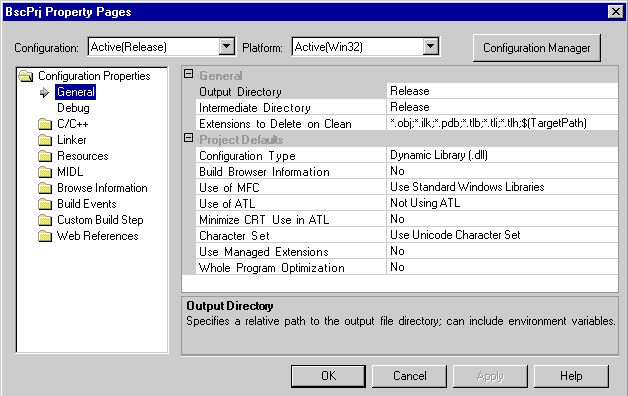Project Configuration Object
The project configuration object manages the display of configuration information to the UI.

Project configuration property pages
The Project Configuration Provider manages the project configurations. The environment and other packages, to gain access to and retrieve information about a project's configurations, call the interfaces attached to Project Configuration Provider object.
Note
You can't create or edit solution configuration files programmatically. You must use DTE.SolutionBuilder. See Solution Configuration for more information.
To publish a display name to be used in the configuration UI, your project should implement get_DisplayName. The environment calls GetCfgs, which returns a list of IVsCfg pointers that you can use to get the display names for the Configuration and Platform information to be listed in the environment's UI. The active configuration and platform are determined by the project's configuration stored in the active solution configuration. The FindActiveProjectCfg method can be used to retrieve the active project configuration.
The IVsProjectCfgProvider object can optionally be implemented on the IVsCfgProvider2 object with the IVsCfgProviderEventsHelper object to allow you to retrieve an IVsProjectCfg2 object based on the canonical project configuration name.
Another way to provide the environment and other projects with access to project configurations is for projects to provide an implementation of the IVsCfgProvider2::GetCfgs method to return one or more configuration objects. The projects may also implement IVsProjectCfg2, which inherits from IVsProjectCfg and thereby from IVsCfg, to provide configuration-specific information. IVsCfgProvider2 supports platforms, and functionality for adding, deleting, and renaming project configurations.
Note
Since Visual Studio is no longer limited to two configuration types, code that processes configurations should not be written with assumptions about the number of configurations, nor should it be written with the assumption that a project that has only one configuration is necessarily either Debug or Retail. This makes the use of get_IsReleaseOnly and get_IsDebugOnly obsolete.
Calling QueryInterface on the object returned from IVsGetCfgProvider::GetCfgProvider retrieves IVsCfgProvider2. If IVsGetCfgProvider is not found by calling QueryInterface on the IVsProject3 project object, you can access the configuration provider object by calling QueryInterface on the hierarchy root browser object for the object returned for IVsHierarchy::GetProperty(VSITEM_ROOT, VSHPROPID_BrowseObject), or through a pointer to the configuration provider returned for IVsHierarchy::GetProperty(VSITEM_ROOT, VSHPROPID_ConfigurationProvider).
IVsProjectCfg2 primarily provides access to build, debug and deployment management objects and allows projects the freedom to group outputs. The methods of IVsProjectCfg and IVsProjectCfg2 can be used to implement IVsBuildableProjectCfg to manage the build process, and IVsOutputGroup pointers for the output groups of a configuration.
The project must return the same number of groups for each configuration that it supports even though the number of outputs contained within a group may vary from configuration to configuration. The groups must also have the same identifier information (canonical name, display name, and group information) from configuration to configuration within a project. For more information, see Project Configuration for Output.
To enable debugging, your configurations should implement IVsDebuggableProjectCfg. IVsDebuggableProjectCfg is an optional interface implemented by projects to allow the debugger to launch a configuration and is implemented on the configuration object with IVsCfg and IVsProjectCfg. The environment calls it when the user elects to start the debugger by pressing F5.
ISpecifyPropertyPages and IDispatch are used in conjunction with property pages to retrieve and display configuration-dependent information to the user. For more information, see Property Pages.